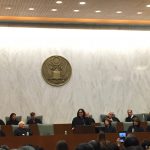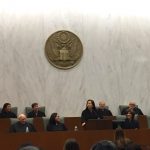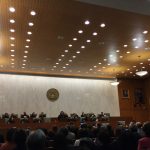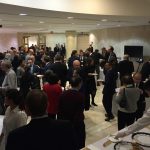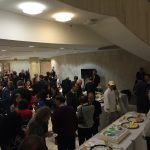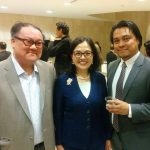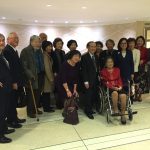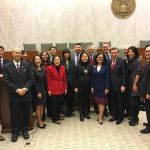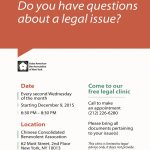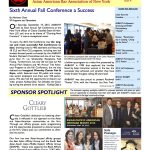Press Release: AABANY Launches Online Educational Resource for Reenactments of Historical Trials Involving Asian Americans
NEW YORK – January 6, 2016 – The Asian American Bar Association of New York (“AABANY”) is excited to announce that it has launched an online educational resource for its historical trial reenactments. Since 2007, under the leadership and directions of Hon. Denny Chin of the United States Court of Appeals for the Second Circuit, and Kathy Hirata Chin, Partner at Cadwalader, Wickersham & Taft LLP, AABANY has produced and performed a series of trial reenactments based on notable trials and cases involving Asian Americans. Performed by a core team of AABANY members at the annual conventions of the National Asian Pacific American Bar Association (“NAPABA”), each dramatic program utilizes the format of a reenactment of an historic trial or appeal. We invite you to visit reenactments.aabany.org to relive and to learn about important aspects of American history that have too often been overlooked, ignored, or forgotten. Read the full press release here.
Japanese American Bar Association Educational Foundation Scholarships
The
Japanese American Bar Association Educational Foundation is pleased to
offer five scholarships of $2,000 each. The scholarships are open to
law students with a demonstrated commitment to community service,
including but not limited to a commitment to serving the API community.
Additional factors may include financial need, adversity, academic
achievement, and desire to practice law in the Southern California area.
The deadline to apply is Sunday, Jan. 17, 2016. The application and instructions are also available at http://www.jabaonline.org/scholarships/
Vietnamese American Bar Association Of Northern California Public Interest Fellowship Program
The
Vietnamese American Bar Association of Northern California (VABANC) Law
Foundation (VLF) Public Interest Fellowship Program will fund one
$50,000 award to a recent law graduate or new attorney for the duration
of one year to provide legal services and advocacy for the
under-served and marginalized communities.
The
VLF Fellowship Program seeks to increase access to legal services on
critical issues and improve the quality of legal services delivered to
under-resourced populations, including but not limited to the Vietnamese
American community.
Applications can be found here, and are due on Jan. 15, 2016, at 5 p.m. PST.
Prudential 2016 1L Summer Internship Program
NAPABA is now accepting applications for the Prudential Summer Internship Program. NAPABA
is pleased to partner with Prudential Financial, Inc. (Prudential) to
provide a meaningful summer internship opportunity for a
highly-motivated first-year law student. Through this partnership,
NAPABA will select 1 student to join the 2016 summer law intern class at
Prudential for a 10-week internship at Prudential’s Newark, New Jersey
offices for a stipend of approximately $10,000.
Deadline to apply is Jan. 29, 2016, by 5 p.m. EST. More information here.
Pro Bono General Counsel Program – APPLY TODAY!
This program seeks to
provide organizations serving the Asian Pacific American (APA) community
with access to high quality, pro bono legal advice and counsel that
they cannot afford. The program is intended to help APA-serving
organizations promote good governance practices and comply with relevant
laws and regulations. Attorneys will have the opportunity to work with
organizations engaged in a broad range of activities to better the lives
of the APA community through policy advocacy, leadership development,
capacity building, and research.
Interested organizations and volunteer attorneys should complete the designated application forms. Applications will be submitted to the database, and organizations will be provided an opportunity to interview and hire a volunteer attorney.
Questions? Contact AuriaJoy Asaria at [email protected].
Learn more about the program and apply here.
Press Release from the Office of the District Court Executive
FOR IMMEDIATE RELEASE
December 28, 2015
CONTACT
Eugene J. Corcoran, (718) 613-2260
Chief Judge Carol Bagley Amon is pleased to announce the investiture of Peggy Kuo as United States Magistrate Judge for the Eastern District of New York. Judge Kuo will be sworn in at the Theodore Roosevelt Courthouse in Brooklyn on Tuesday, January 5, 2016 at 5:00 P.M.
Judge Kuo is the first Taiwanese-American federal judge in New York. Before her appointment, Judge Kuo was the Deputy Commissioner and General Counsel of the New York City Office of Administrative Trials and Hearings, the largest municipal tribunal in the country. Previously, she was Chief Hearing Officer at the New York Stock Exchange, where she was in charge of disciplinary matters involving violations of federal securities laws. She was also litigation counsel at WilmerHale, LLP.
From 1998 to 2002, Judge Kuo prosecuted war crimes at the UN International Criminal Tribunal for the former Yugoslavia in The Hague. Her historic trial regarding mass rape in Bosnia later became the topic of the documentary film “I Came To Testify.”
After clerking for the Honorable Judith W. Rogers, then Chief Judge of the D.C. Court of Appeals, Judge Kuo worked as a federal prosecutor, first as an Assistant US Attorney in the District of Columbia, prosecuting general crimes. She then became a trial attorney and Acting Deputy Chief of the Civil Rights Division Criminal Section at the US Department of Justice, where she investigated and prosecuted hate crimes and allegations of police misconduct.
Judge Kuo was born in Taiwan and moved to the United States at the age of three. She graduated from Yale University and Harvard Law School.
Ignoring Asian-Americans
To the Editor:
Re “Diversity Makes You Brighter,” by Sheen S. Levine (Op-Ed, Dec. 9):
Glaringly absent from an otherwise excellent study are Asian-Americans. Even after a couple of centuries of being here, Asian-Americans are too often missing from the dialogue on diversity in the United States.
Perhaps it’s because we are considered the “model minority” that seemingly is not disadvantaged, or perhaps it’s because we are still viewed as perpetual foreigners. And it doesn’t help that even in this study, the only Asians mentioned are those in foreign countries.
From Austin So, General Counsel at Heraeus, NAPABA Northeast Regional Governor, AABANY In-House Counsel Committee Co-Chair.
Published in the New York Times, Dec. 23, 2015.
Thank you, Austin, for speaking up!


